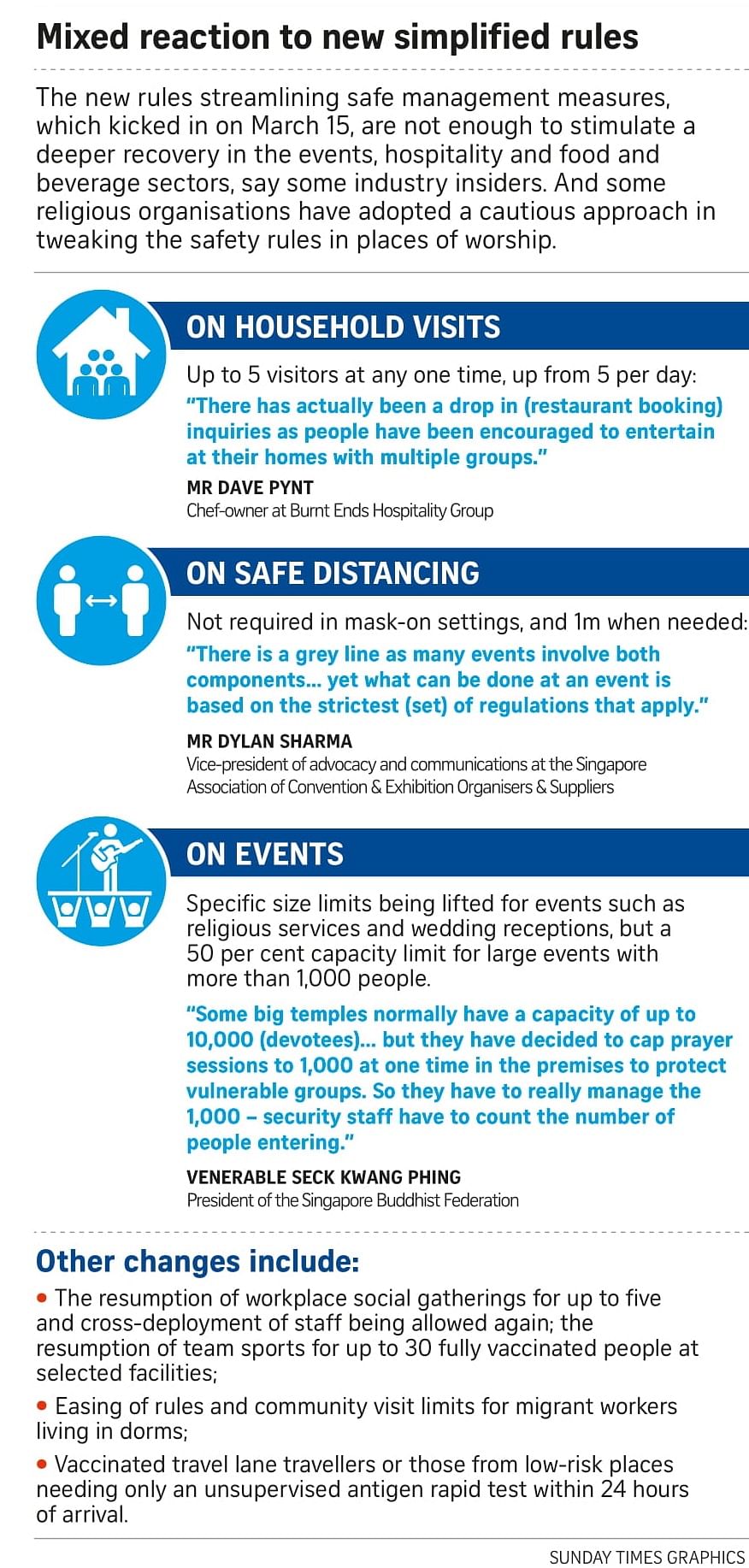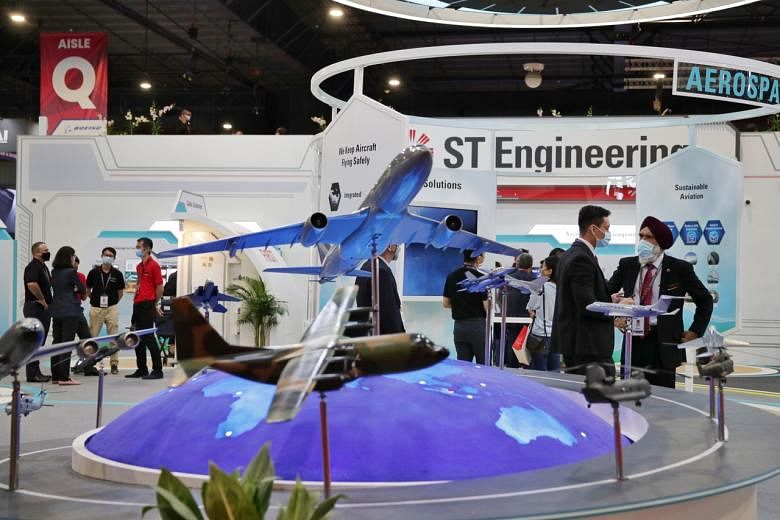SINGAPORE - The events, food and beverage, and hospitality sectors - among the worst hit by the Covid-19 pandemic - applauded streamlined Covid-19 measures that kicked in on Tuesday (March 15).
But the recovery of these sectors will be limited, unless measures ease further, said industry insiders.
Changes like lifting specific attendance limits for events with fewer than 1,000 people and removing zoning requirements lower the costs of organising events, said Mr Edward Liu, managing director of events organiser Conference and Exhibition Management Services.
"Without the constraints, we could save on hiring more temporary staff to man the zones within exhibition halls and the deployment of safe distancing ambassadors," he said.
Mr Dylan Sharma, vice-president of advocacy and communications at the Singapore Association of Convention and Exhibition Organisers and Suppliers, said the meetings, incentives, conferences and exhibitions (Mice) industry welcomed the streamlining, but recovery remains an ongoing journey.
"As we move towards an endemic Covid-19, scaling up business capacities to where it was pre-pandemic is not so straightforward," said Mr Sharma, citing the loss of talent to other industries as many pandemic-hit companies scaled back.
He also said the streamlining is relatively clear around social distancing requirements in settings with and without mask-wearing.
But he added: "There is a grey area as many events involve both components... yet what is allowed at an event is based on the strictest regulations that apply."
This means events management companies and organisers have their hands tied when it comes to organising events longer than half a day.
For instance, he said, it is "almost impossible" to hold conferences that last for a full day or multiple days without catered food.
Yet catering would mean the rest of the event has to adhere to stricter social distancing rules, even when masks are worn outside meal times.
Similar concerns were raised by Ms Margaret Heng, executive director of the Singapore Hotel Association (SHA).
She said the 160 member hotels of SHA hope rules for food and beverage services during business events can be less stringent.
Ms Heng said: "To expedite the industry's recovery, we should now address the need to improve revenue contribution from the banqueting and catering segment.
"With the recent streamlining of safe management measures, we have seen only a marginal increase in demand, especially for smaller event venues."
She added: "Ideally, we will soon be allowed to host larger table sizes beyond five persons to drive more food and beverage revenue for restaurants and event spaces."
Food and beverage industry insiders are also clamouring for an increase in the maximum size of dining groups allowed.
A spokesman for the Restaurant Association of Singapore said it hopes eight vaccinated people could dine at food and beverage outlets "much sooner than later", noting that the utilisation of intensive care unit (ICU) beds and number of severe cases in Singapore are "well under control".
"The only way (this streamlining) affects the industry is it encourages people to go to houses... there has been a drop in inquiries of 15 per cent to 20 per cent as people have been encouraged to entertain at home with multiple groups," said chef and restaurateur Dave Pynt, referring to the maximum number of household visitors being eased to five people at a time, from five per day.
He hopes that the 10.30pm limit on serving alcohol to patrons and the need to check in and out on TraceTogether, among other measures, can be lifted.
"(This) would be much appreciated by the community and the industry now that 95 per cent of the population is vaccinated, and with an infection growth rate of under one for over a week and fewer than 30 people in ICU," he said.
He added that prolonged restrictions on the industry have prompted him to scrap plans for a new establishment in downtown Singapore, in favour of an undecided location overseas.
Some medical experts said measures can be eased further without placing more pressure on hospitals.
"I think the social needs of people aren't really going to be satisfied with five people allowed at home at one time, and I'm not sure having 10 (vaccinated people) is really going to destroy hospitals," said Professor Dale Fisher, senior infectious diseases consultant at the National University Hospital, in a roundtable discussion organised by The Straits Times on Tuesday.
"We're a species that needs to socialise, we're a species that needs to work to provide for our families and to provide for our recreation," he said.
How religious worship is undertaken has also changed with the streamlining of safety measures.
The Catholic community can now make bookings to attend mass at any church, rather than the church they are registered with.
"We are also actively looking into increasing the seating capacities of our churches to accommodate more people during masses, while still ensuring that our churches continue to be vigilant in enforcing safety measures currently in place," said the Archbishop's Communications Office from the Roman Catholic Archdiocese of Singapore.
Venerable Seck Kwang Phing, president of the Singapore Buddhist Federation, said the streamlining, which lifted event size limits for religious services, means prayer halls can accommodate more devotees to chant together.
"As the halls are small, and there was zoning and social distancing... some worshippers have tried to make bookings and failed many times."
Larger temples that could have accommodated more devotees under the streamlined rules, which permit a maximum capacity of 50 per cent for events with more than 1,000 people, have still capped the number of people attending prayer sessions at 1,000 as a precaution against infecting the vulnerable, he added.
But some of the industry insiders ST spoke to said it is too early to gauge the effect of the streamlining on their industries.
"While the food and beverage sales figures in December 2021 and January 2022 grew between 17 per cent and 20 per cent, as compared with November 2021 figures, the recovery... still remains to be seen as December and January are typically (the) festive months of Christmas, Chinese New Year and school holidays," said the Restaurant Association spokesman.
Likewise for the events industry, where there is a gestation period of six to 12 months for a business event, said Mr Sharma.
"Any streamlining of measures that takes place today really serves to catalyse planning for the long term; we are not going to see results from April or May, but September onwards," he said.



